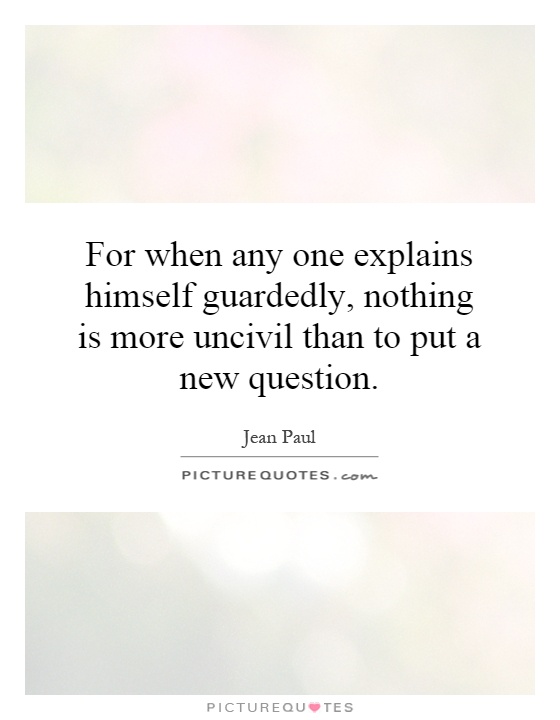For when any one explains himself guardedly, nothing is more uncivil than to put a new question

For when any one explains himself guardedly, nothing is more uncivil than to put a new question
In the context of Jean Paul, a German Romantic writer known for his complex and philosophical works, the quote "For when any one explains himself guardedly, nothing is more uncivil than to put a new question" holds particular significance. Jean Paul's writing often delves into the depths of human emotion, psychology, and existential questions, making it crucial for readers to approach his work with a sense of openness and understanding.Jean Paul's writing style is characterized by its intricate and layered nature, often requiring readers to carefully consider each word and sentence in order to fully grasp the depth of his ideas. In this sense, when someone explains themselves guardedly, it is important to respect their thought process and not disrupt the flow of their explanation by interjecting with new questions. By doing so, one can show a level of civility and respect for the speaker's perspective, allowing them to fully express their thoughts without interruption.
Furthermore, Jean Paul's emphasis on the importance of self-expression and introspection in his works highlights the need for individuals to be able to communicate their thoughts and feelings openly and honestly. When someone is explaining themselves guardedly, it may indicate a sense of vulnerability or hesitation in sharing their true thoughts and emotions. In such instances, it is crucial to create a safe and supportive environment for the speaker to feel comfortable in expressing themselves without fear of judgment or interruption.
By refraining from putting a new question when someone is explaining themselves guardedly, one can demonstrate empathy, understanding, and respect for the speaker's perspective. This allows for a more meaningful and authentic exchange of ideas, fostering a sense of connection and mutual understanding between individuals. In the context of Jean Paul's philosophical works, this quote serves as a reminder of the importance of active listening, patience, and empathy in engaging with complex and profound ideas.












 Friendship Quotes
Friendship Quotes Love Quotes
Love Quotes Life Quotes
Life Quotes Funny Quotes
Funny Quotes Motivational Quotes
Motivational Quotes Inspirational Quotes
Inspirational Quotes